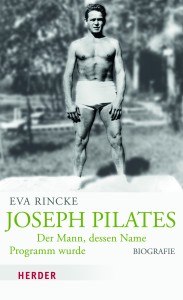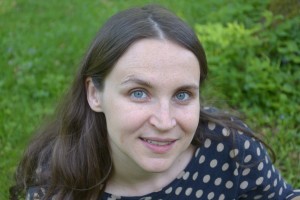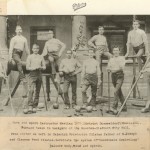Source: Stadtarchiv Mönchengladbach
Joe Pilates’ Childhood In Poverty – by historian Eva Rincke (Part 1)
“Perfecting the knee bend and many things to commend, his youth was gymnastic to the end.” – Joachim Ringelnatz, Setting up the Equipment (First Draft)
There is a copy of an old photograph at the city archives in Monchengladbach showing a group of gymnasts in front of the Gladbach city hall. In the foreground the men are holding barbells and long wooden poles for pole-vaulting. Those in the background are sitting on gymnastic equipment: two are on the parallel bars and two are on the pommel horse. Their carriage is erect as they proudly pose for the camera. In the middle of the group is a well-built, middle-aged man with a moustache leaning on a large iron bar with weights on both ends. It is Friedrich Pilates, Joseph’s father.[i]
The photo got to the city archives in a roundabout way. In the 1980’s an American couple were at a garage sale in St. Louis and found the picture. Their surname was Gladbach and they recognized the Gladbach city hall after having visited it on a trip to Europe. They sent their find to the mayor of Gladbach who then gave it to the city archives. When Pilates got popular in Germany and it came out that the method’s creator was from Monchengladbach, suddenly the photograph was of interest to all of the Pilates enthusiasts in the world. His fans started to pilgrim to Monchengladbach to see where their idol had his roots.[ii]
When Joseph Pilates was born on December 9, 1883, Gladbach was a small industrial town in the west of the Prussian kingdom near the Belgian border. Friedrich Pilates was a metal worker who was not able to afford a life in comfort for his son Joseph.
Joseph was Friedrich and Helena Pilates’ second child. In the years that followed, the family continued to grow with Helena giving birth to nine children altogether.[iii] His parents were from the Gladbach region and his ancestry can be traced to the area for many centuries. The surname Pilates comes from a homestead, the “Plates-Gut”, from which the owner took the name in the 16th century. Since then many surnames have developed: Pilatus, Platis, Pylatus, Plate, Plattus and Pilates. Many of the Pilates descendants lived in Gladbach and in the surrounding towns and counties.[iv]
Joseph began school at the age of six. In Prussia all children were required to attend eight years of school, even those from poor families. Only a few decades prior it was normal for children to work in factories or at home at the loom for up to 12 hours a day in up-and-coming industrial towns such as Gladbach. However in the 1870’s the authorities began to enforce compulsory education for all children and ended child labor.
Joseph Pilates didn’t feel very comfortable at school. Changing schools so often, a result from moving, made it difficult for him to make friends in his class and feel at home. Instead of playing with the other children in the school yard he usually sat on the side and watched them. He was not interested in their games. They usually ran around wildly or threw a self-made ball of rags or paper back and forth. But he observed them closely. His schoolmates wore the same kind of patched-up clothing made of cheap fabric that he did. They wore shoes that were either too big or too small for them. Their faces were dirty and they had runny noses and were as skinny as beanpoles. Still they were adept. Their steps were light and agile. Sometimes a child would stop in the middle of a game and stretch or would jump up in the air. Joseph Pilates noticed that they breathed more deeply and quickly when they played but that it was never irregular. They did not treat their bodies as if they were cumbersome, unfamiliar things the way most adults and especially his teachers did. The other children reminded him of animals, however he preferred animals.
When his classmates weren’t running around, jumping up and down or throwing each other into the dirt they were usually teasing, annoying or taunting each other. They sang jibing songs and rhymes to each other. They also enjoyed singing about strict teachers who usually suffered great misfortune in their songs. The children knew a lot of traditional material, picking up rhymes from their older siblings or making them up themselves. They thought up nicknames for people, made fun of pointed noses, fat bellies and freckles. And they made fun of the introvert Joseph Pilates.
On his way home from school they would call after him, “Pontius Pilate, killer of Christ”. That really got to him. He would walk faster and duck into alleyways to get away from them. He usually tried to run home as soon as the bell rang in order to avoid his persecutors. One time he couldn’t escape them and he was so furious that he decided to fight back – it was an uneven fight.[v]

When he couldn’t take it anymore Joseph would go into the woods instead of to school. He was glad to get away from the stench of garbage and excrement, from horse manure, bleach and rotten food that hung over the town. When he directed his footsteps out of the city and into the Hardt forest he was able to leave behind the rumbling wheels of wagons, the adults’ loud talking and the constant, high-pitched buzz of children’s voices. He liked the sounds of the woods, the cracking of branches and the rustling of small animals in the underbrush. He liked the scents that changed with the seasons, mossy or sweet, or slightly fermented when wild fruits were left on the ground in the fall. But what he liked most of all was to observe the animals in the woods.
Whenever he saw an animal, he would watch its movements as if magnetized. He had even found his own blind, a blind that had not been kept up, the wood rotting, two rungs missing in the ladder and a hole in the floor of the platform. He would go there again and again and wait for deer. He never got bored, even when there were no deer. He would detect squirrels, rabbits, fox and birds: jaybirds, wood pigeons, blackbirds and tits, woodpeckers and magpies. He would watch for animals and would observe them, deeply engaged, for hours on end. He was impressed at how silently and elegantly they got about. They never made an unneeded movement, their gait was not stiff. The way a squirrel would tense its entire body when it made ready to jump, the distance it would jump and how accurately it would land. He admired their effortlessness, how they lolled about or stretched, how they were at one with their bodies.[vi]
 Eva Rincke was born in Leonberg near Stuttgart, Germany, in 1981. She went to Humboldt-Universität, Berlin, where she got her master of arts degree in history and philosophy. Between 2007 and 2010, Eva worked at Buchenwald memorial, preparing an exhibition on Forced Labour. She started writing a novel inspired by her work and received several writing scholarships.
Eva Rincke was born in Leonberg near Stuttgart, Germany, in 1981. She went to Humboldt-Universität, Berlin, where she got her master of arts degree in history and philosophy. Between 2007 and 2010, Eva worked at Buchenwald memorial, preparing an exhibition on Forced Labour. She started writing a novel inspired by her work and received several writing scholarships.[i] Stadtarchiv Monchengladbach, image 10/34201.
[ii] Stadtarchiv Monchengladbach, reference source for the image 10/34201, verbal information from the registrar Gerd Lamers and archive entry on Hubertus Joseph Pilates in: „Stadtgeschichte: Beiträge, Aufsätze, Notizen“, p. 1.
[iii] Stadtarchiv Monchengladbach, registration card: Heinrich Friedrich Pilates.
[iv] Stadtarchiv Monchengladbach, Gerd Lamers, archive entry on Hubertus Joseph Pilates, see above, p. 2 ff.
[v] Doris Hering, They all go to Joe’s, Dance Magazine, February 1956, p. 76.
[vi] Robert Wernick “To Keep in Shape: Act like an animal”, Sports Illustrated, February 12, 1962; Evelyn Ringold, “The Eighth Avenue Contrologist”, New York Herald Tribune, January 5, 1964 and “…a reformer’s progress”, in: Joseph Pilates / Frederick Rand Rogers, Return to life through Contrology (brochure), 1957 (NYPL, Fern Helscher Papers, Box 8, Folder 9).

